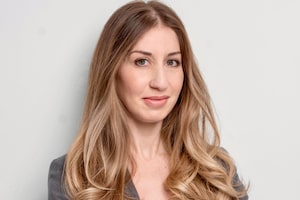Ukrainian President Volodymyr Zelenskiy in Kyiv, Ukraine, March 1.UMIT BEKTAS/Reuters
How silly it seems now, sobered by the reality of war in Europe, that we once considered “bravery” in politics to be speaking out against a party leader, or breaking with caucus consensus. Bravery is protesting a military invasion of Ukraine seven years after opposition leader Boris Nemstov was assassinated near the Kremlin for doing exactly that. It is Alexey Navalny tweeting from jail – after being poisoned with a nerve agent and nearly dying – that Russian President Vladimir Putin is an “obviously insane czar” for sending “Russians to kill Ukrainians.” And it is Ukrainian President Volodymyr Zelensky staying to defend his country when there is a hit out on his life, and when other leaders in his position would have accepted a U.S. offer to evacuate.
The unlikeliness of Mr. Zelensky’s accession from TV comedian to wartime hero is what makes his sudden role as defender of a rules-based order so stunning. He campaigned back in 2019 on a promise to clean up corruption in Ukraine and bring peace to the Donbas, though he was dismissed by his critics as unserious, inexperienced and possibly in the pocket of oligarch Ihor Kolomoisky. Mr. Zelensky nevertheless won in a landslide over incumbent president Petro Poroshenko, and he succeeded in renewing peace talks with Mr. Putin over conflicts in eastern Ukraine (the two sides even agreed to a prisoner exchange in late 2019).
But it’s undeniable now, and was probably still evident then, that Mr. Putin was never really interested in peace; as he met with Mr. Zelensky in Paris to talk about resolutions, Russian media at home was busy reporting that shellings in the Donbas had only increased under Ukraine’s new peace-seeking President. Back in October, Russian Security Council Deputy Chairman Dmitry Medvedev said that Mr. Zelensky was too flighty, too torn between his native Russian tongue and political commitments to Ukraine to be a serious party to discussing peace. He added that Ukraine is led by “weak people” who seek only to “line their pockets.”
Perhaps Mr. Putin believed too much of his own state propaganda in assuming that Mr. Zelensky didn’t have the personal resolve to defend his country after Russia declared war. Or perhaps he assumed that a Russian invasion of Ukraine would follow the model of the Taliban in Afghanistan in the fall, when former Afghan president Ashraf Ghani fled Kabul as soon as Taliban forces closed in on the capital. But had Mr. Zelensky evacuated the country and tried to lead a government in exile, it’s almost certain we wouldn’t have seen the level of resistance to the Russian invasion exhibited by both Ukrainians and the Western world.
Before Mr. Zelensky made his personal video appeal from a bunker in Kyiv to European leaders last Thursday, no country was seriously considering cutting Russia off from SWIFT or personally sanctioning Mr. Putin or Russian Foreign Minister Sergei Lavrov. But according to reporting by Politico and other news outlets, the mood changed after Mr. Zelensky told EU leaders that he was staying in the capital to defend his country, and that it might be the last time they would see him alive. Indeed, this would not be a swift takeover of Ukraine, as Mr. Putin might have assumed, and so if Mr. Zelensky was going to stay and fight, the Western world would have to put up more of a fight, too. His message, according to an EU diplomat who later spoke to Politico, translated “into a determination to go beyond what had originally been conceived.”
But the most significant impact Mr. Zelensky’s decision to remain in his country surely had was on the Ukrainian people themselves. If a TV comedian-turned-president could risk his life for a country that Mr. Putin said was not real and had no legitimate claim to sovereignty, then so too could a teacher, a ballet dancer, a computer programmer or a contractor. Grandmothers could sit in the streets making Molotov cocktails, and 18-year-olds could leave their comfortable lives in Canada to join the resistance in Ukraine. “We are seeing the real essence of what makes us Ukrainians,” writer and poet Andriy Lyubka wrote on Facebook as he observed an enormous civilian militia take shape in those first few days. “Even those who never particularly considered themselves patriots [...] This is a moment of absolute unity.”
In his last-ditch plea to Russians ahead of Mr. Putin’s declaration of war, Mr. Zelensky said: “When you attack us, you will see our faces, not our backs.” And that is indeed what Russian soldiers are seeing, evidently to their own surprise, when they rolled up in tanks to Chernihiv and were received as unwelcome occupiers, as opposed to grand liberators. No matter how this bloody, horrific and unnecessary war plays out, the Kremlin will never be able to claim it was for the sake of Ukrainians somehow desperate for liberation. Mr. Zelensky set the tone for the domestic and international resistance, at the risk of his own life. That is genuine political bravery.
Keep your Opinions sharp and informed. Get the Opinion newsletter. Sign up today.
 Robyn Urback
Robyn Urback